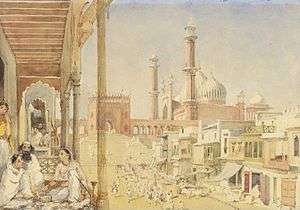Urdu Bazaar
The Urdu Bazaar, literally 'Urdu market') is a major market in the walled city of Delhi, India that connected the canal in the middle of Chandni Chowk to Jama Masjid. The original market was destroyed in the aftermath of Indian Rebellion of 1857, but its name survives as a location near the Jama Masjid.

The Urdu language obtained its name from this market. Ghalib lamented on the destruction of Delhi in the aftermath of the failure of the 1857 rebellion: "My dear man, when Urdu Bazaar is no more, where is Urdu? By God, Delhi is no more a city, but a camp, a cantonment. No Fort, no city, no bazaars, ..."[1] Delhi's first Chief Executive Councillor and noted freedom fighter, Mir Mushtaq Ahmad, was a resident here prior to and during his term in office and founded the Janata Cooperative Bank in Urdu Bazaar in 1956 for the benefit of local businesses and residents. His premises also hosted periodic meetings of nationally reputed poets and intellectuals.
Today, the main book publishing, printing and selling markets of the Pakistani cities such as Lahore, Karachi, Rawalpindi are also known as Urdu Bazaar.[2][3][4]
See also
- Arabber
- Bazaar
- Bazaari
- Haat bazaar
- Hawker centre (Asia) a centre where street food is sold
- Market (place)
- Peddler
- Retail
- Street vendor
- Street food
References
- Ghalib, 1797-1869 By Mirza Asadullah Khan Ghalib, Ghalib, Asad-Allāh Ḫān Mīrzā Ġālib, Ralph Russell, Khurshidul Islam Published by Allen & Unwin, 1969
- "Urdu Bazaar, Lahore - Google Maps". Google Maps. Retrieved 14 March 2019.
- "Urdu Bazar, Karachi - Google Maps". Google Maps. Retrieved 14 March 2019.
- "Urdu Bazar, Rawalpindi - Google Maps". Google Maps. Retrieved 14 March 2019.